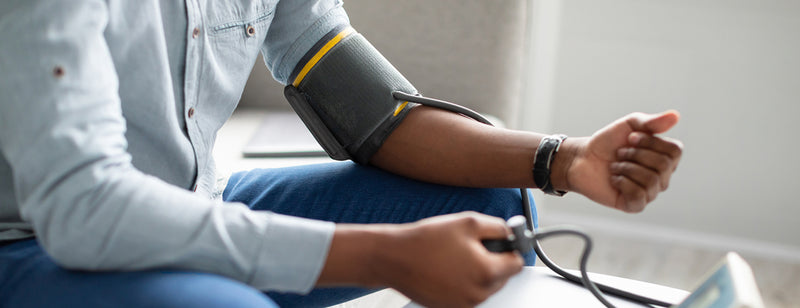We all have blood pressure. It comes about as the heart pumps blood around the body. The problems arise when it is consistently higher than it should be. This puts you at a greater risk of stroke and heart disease. But there are things you can do to reduce your blood pressure. We take a look at high blood pressure and how to manage it below.
What is blood pressure?
Our heart is a pump - it pumps blood around our body in tubes called arteries. This pumping action creates a natural pressure in these tubes called blood pressure. Normal blood pressure is described as two numbers one above the other e.g. 120/80. It has a normal range and can vary throughout the day and with activity. It can be affected by external factors such as smoking, caffeine and stress.
If the blood pressure is consistently above the normal range it is called high blood pressure or hypertension.
How do I know if I have high blood pressure?
One of the most important things to know about high blood pressure is that unless at extreme levels it is usually SILENT – it causes no obvious symptoms by itself.
Fortunately, it can be easily measured. It is recommended that this be undertaken by your GP or other health professional for accuracy. Often to further analyse blood pressure a blood pressure monitor can be used – a small computer, the size of a walkman that can be worn for 24 hours at home.
Why is high blood pressure important?
It's useful to think of high blood pressure not as a disease in itself, but as a risk factor. In particular, untreated high blood pressure is a risk factor for stroke and heart disease.
If you are overweight, have diabetes, smoke or have a family history of stroke or heart disease, this further increases your risk substantially.
What can you do to lower blood pressure?
- If you are overweight – try to lose weight
- If you smoke – stop smoking
- Reduce your alcohol intake
- Reduce your salt intake
- Exercise
It is vital to put these lifestyle changes in place even if you are also prescribed blood pressure medication by your doctor. For many, lifestyle changes may be enough to keep high blood pressure under control.
What does blood pressure medication do?
Blood pressure medication usually works directly on the blood vessels or the heart to reduce the pressure in the system. There are four main types of blood pressure medication that target the blood pressure in different ways. It is likely that a person may be started on more than one blood pressure medication.
Using more than one medication in combination together, at the lowest possible doses often gives the best results with the least potential for side effects.
Medication like lifestyle changes will only reduce blood pressure if it is taken regularly and sustained.
Why is salt so important?
Salt itself is a silent killer. It is a major cause of high blood as it draws fluid into the blood vessels and therefore increases the pressure in the tubes. Salt is added to almost every food we consume these days bar fresh meat, fish and fruit and vegetables. Anything with a shelf life like soups, sauces, breads, breakfast cereals, and even sweet things contain significant amounts of salt, the taste often hidden by sugar.
Processed microwave dinners and fast food are extremely high in salt.
Many of us are consuming 3-4 times the recommended daily amount, hidden in our food before we even think of adding salt in cooking or at the table.
For example the average sliced pan has about 1/6th of our daily recommended salt limit in just one slice. If you have a couple of slices of toast at breakfast and a sandwich at lunch, the bread alone provides two thirds of your maximum recommended salt intake per day.
Read about some ways to keep your heart healthy here.
Please note, this blog is for informational purposes only and should not replace medical advice.
It’s always best to consult your doctor before taking any new supplements, treatments or remedies if you are pregnant, breastfeeding or on medication.
Checked and updated: 17 August 2021













